 Petzlover
Petzlover Bully Kutta is originated from India but Great Pyrenees is originated from France. Bully Kutta may grow 7 cm / 3 inches higher than Great Pyrenees. Bully Kutta may weigh 36 kg / 80 pounds more than Great Pyrenees. Both Bully Kutta and Great Pyrenees has same life span. Both Bully Kutta and Great Pyrenees has almost same litter size. Bully Kutta requires Low Maintenance. But Great Pyrenees requires Moderate Maintenance
Bully Kutta is originated from India but Great Pyrenees is originated from France. Bully Kutta may grow 7 cm / 3 inches higher than Great Pyrenees. Bully Kutta may weigh 36 kg / 80 pounds more than Great Pyrenees. Both Bully Kutta and Great Pyrenees has same life span. Both Bully Kutta and Great Pyrenees has almost same litter size. Bully Kutta requires Low Maintenance. But Great Pyrenees requires Moderate Maintenance
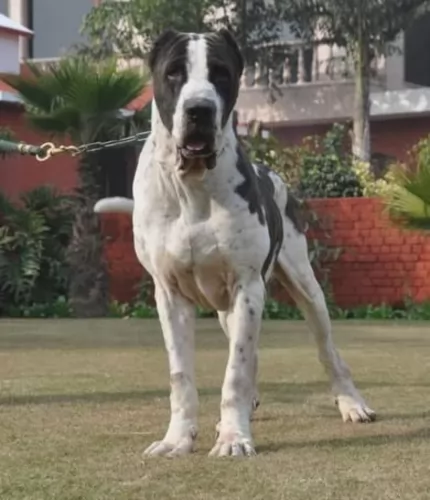 This well built, powerful dog breed is also known as Indian Alangu Mastiff or Pakistani Mastiff. These dogs come from the Punjab and Sindh region of the Indian subcontinent. It is believed that mastiff dogs came with British soldiers during the British invasion, however English Mastiffs, Bulldogs, Bull Terriers and Great Danes are seen as potential ancestors of this large dog.
This well built, powerful dog breed is also known as Indian Alangu Mastiff or Pakistani Mastiff. These dogs come from the Punjab and Sindh region of the Indian subcontinent. It is believed that mastiff dogs came with British soldiers during the British invasion, however English Mastiffs, Bulldogs, Bull Terriers and Great Danes are seen as potential ancestors of this large dog.
There are disputes about the country of origin of this breed, and some people claim that the dog comes from India, while others say it comes from Pakistan. Certainly in Pakistan these dogs are still used for fighting.
 The Great Pyrenees could be from Spain or France because the dog hails from the Pyrenees Mountains, which spans both France and Spain.
The Great Pyrenees could be from Spain or France because the dog hails from the Pyrenees Mountains, which spans both France and Spain.
The dog was used to defend flocks from predators but its lineage goes a long way back, thousands of years in fact. It is thought that they only arrived in Europe about 5,000 years ago. The dog was adopted into the court of Louis the XIV as a royal dog.
During the mid 1600s, the dog's numbers dwindled but the French developed kennel clubs where the dog could be bred and its numbers restored. It was in 1933 that the Great Pyrenees received American Kennel Club recognition.
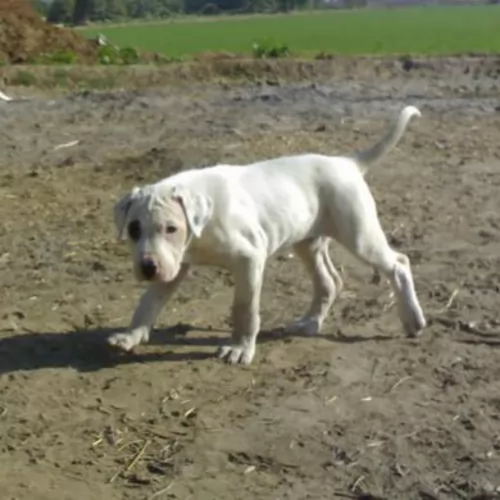 The Bully Kutta is a big, heavy, muscular dog, standing at roughly 81 – 89cm and weighing in at 70–90kg. He isn’t particularly good with children or with other pets simply because the dog is aggressive by nature. If you do opt for this large breed, you’re going to need a large garden and he is going to require a lot of exercise.
The Bully Kutta is a big, heavy, muscular dog, standing at roughly 81 – 89cm and weighing in at 70–90kg. He isn’t particularly good with children or with other pets simply because the dog is aggressive by nature. If you do opt for this large breed, you’re going to need a large garden and he is going to require a lot of exercise.
This is a dog breed that is going to require socialization and training if you want him to be obedient and calm, as he is inclined to be a dominating breed. He’s an intelligent dog and when well trained, he makes a splendid pet with firm, fair owners.
The Bully Kutta has a large, broad head which is supported by a thick well-muscled neck. The skin around his lower jaw is loose. The ears are short, set high and are mostly cropped, but other times they are left to flop over. The tail is sometimes docked but these days mostly left long and tapered.
He has a short smooth coat and is essentially white in color although the coat can also be fawn, brown, black or brindle.
 This is a beautiful dog, noticeable by the essentially white coat and his overall size, standing at 70 to 82cm and weighing between 40 to 54 kg.
This is a beautiful dog, noticeable by the essentially white coat and his overall size, standing at 70 to 82cm and weighing between 40 to 54 kg.
The double coat is medium to long, coarse and straight or wavy and and it can be solid white, cream or white with patches of light tan or grey.
The nose is black, the eyes brown, the ears of medium length and floppy and the tail long and plumed.
The Great Pyrenees is an intelligent, strong willed dog with a mind of his own so he will be able to be trained and socialized successfully.
His huge size will require that he be trained because when he is indoors he can knock things over and he must be able to respond to you telling him to lie down.
As a large dog, he isn’t suited for tiny homes, as he requires lots of space even though he doesn’t require a lot of exercise. Not only that, he takes his watchdog duties seriously and he is inclined to bark a lot, and in a small place, you’ll be getting constant complaints from the neighbors.
When trained and socialized, your big dog is social, active and loving. He gets on well with children, the elderly and with pets in the home. He isn’t that overly active and will happily make himself at home on your couch and bed.
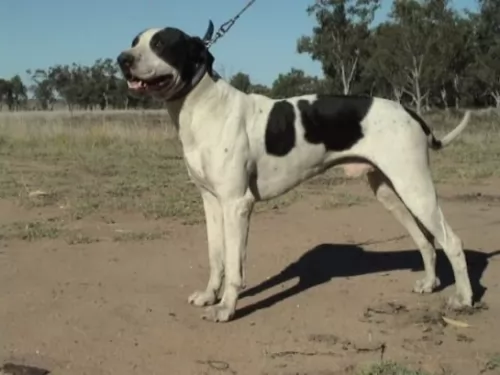 The Bully Kutta is a powerful, imposing dog and they have been nicknamed the ‘Beast from the East’. Unfortunately it is this dog’s thick bones, his looks and his strength that have him used for cruel dog fighting in Pakistan.
The Bully Kutta is a powerful, imposing dog and they have been nicknamed the ‘Beast from the East’. Unfortunately it is this dog’s thick bones, his looks and his strength that have him used for cruel dog fighting in Pakistan.
When not used for fighting, he makes a loyal, devoted companion for the owner who ensures proper socialization and training. Well raised Bully Kuttas are then good with children, being loving, protective and playful.
One just hopes that the future of this giant dog breed is brighter, and that he will be looked upon as more of a companion that just a dog-fighting object to bring in money for his owner.
 The Great Pyrenees is such a calm, independent, serious, well-mannered dog who loves to be around his human family and to please them. He is gentle and knows how to behave well around children, the elderly as well as with any pets in the home.
The Great Pyrenees is such a calm, independent, serious, well-mannered dog who loves to be around his human family and to please them. He is gentle and knows how to behave well around children, the elderly as well as with any pets in the home.
He makes a wonderful companion and although he loves indoor life as much as outdoor life, he is much happier settling into life in the country or the suburbs as opposed to life in the city and a tiny property.
Give your big white coated pet all the love he thrives on, and you'll enjoy a wonderful relationship with this large, amicable dog.
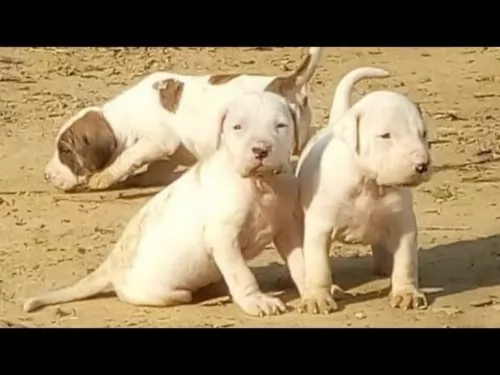 Your Bully Kutta is generally a healthy dog and not often affected by hereditary diseases, but with giant breeds such as this you will have to look out for diseases common to large dogs.
Your Bully Kutta is generally a healthy dog and not often affected by hereditary diseases, but with giant breeds such as this you will have to look out for diseases common to large dogs.
Typical illnesses to watch out for will include hip dysplasia, arthritis, skin allergies and bloat.
This is an inherited condition where the hip joint is improperly formed. For your Bully Kutta it causes wear and tear as well as stiffness in the hips and your dog battles to rise after lying down.
Arthritis in your dog can be managed but it can cause a lot of discomfort for him. This inflammation of the joints can cause pain and stiffness. It is more often seen in older dogs. It can also start at an early age because of problems with bone and joint development and abnormal rubbing within the joint.
Today there are a number of therapy options that can bring some kind of relief to your dog.
 Your Great Pyrenees is a big dog with an average lifespan of 10 to 12 years. His large size means you will need to look out for typical 'big dog' ailments such as hip dysplasia.
Your Great Pyrenees is a big dog with an average lifespan of 10 to 12 years. His large size means you will need to look out for typical 'big dog' ailments such as hip dysplasia.
This problem can cause your pet to be in pain and he can also become lame, battling to walk and play and battling to get up after lying down.
Also, look out for bone cancer with your pet and as mentioned previously, bloat, which is a life threatening disease where the stomach of the dog swells up.
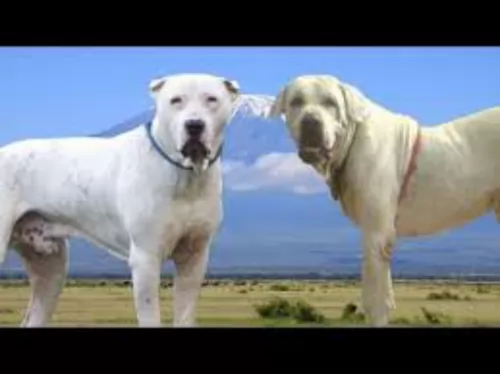 The short coat is low maintenance and as a moderate shedder too, all that is required really is to give your Bully Kutta a good brush twice a week to keep the coat in good condition.
The short coat is low maintenance and as a moderate shedder too, all that is required really is to give your Bully Kutta a good brush twice a week to keep the coat in good condition.
Brush his teeth 2 or 3 times a week with special canine-toothpaste and toothbrush to prevent plaque build-up. He’s a drooler too, so you will need to wipe his face and maybe your clothes of slobber from time to time.
This strong, muscular dog of yours will require an excellent diet. It’s always wonderful if you can give him home-made food such as vegetables, rice and meat. These days you get excellent commercially manufactured food for dogs, and your vet can advise you on the best food for a large, active dog such as the Buly Kutta.
Raw meat is absolutely essential for your dog from time to time and will ensure that his coat doesn’t become dull and with bald spots. Remember, that before dogs were domesticated they used to live on raw meat, so see that he gets some raw meat to prevent skin disorders. Make sure your large pet has a constant supply of fresh, cool water.
Bully Kuttas are going to need a walk every day in the form of exercise. If he is socialized you can take him into the park for ball games. He is a dog that will require plenty of space.
 Your Great Pyrenees isn't going to be a dog leaping around you demanding a game or walk like what you get from some energetic dogs. He certainly doesn't require strenuous exercise but will require a nice, brisk walk every day. Give him some ball or rope games too. He's territorial and likes large grounds to walk around and guard and this constant guarding is a good form of exercise too.
Your Great Pyrenees isn't going to be a dog leaping around you demanding a game or walk like what you get from some energetic dogs. He certainly doesn't require strenuous exercise but will require a nice, brisk walk every day. Give him some ball or rope games too. He's territorial and likes large grounds to walk around and guard and this constant guarding is a good form of exercise too.
With two layers, the coat of the Great Pyrenees will need to be brushed twice a week to prevent burrs attaching to the fur and to prevent it from matting, It also gets rid of loose hair during shedding.
He tends to drool so it's handy keeping a damp cloth close by just to give his face area a wipe down. Your dog's ears will need to be cleaned with special ear-cleaning lotion and his nails will also need to be trimmed.
Socialize your Great Pyrenees with other dogs and people from a young age. Without proper socialization, this breed can become territorial and possessive of his family, which could lead to aggression. He bonds with his family but tends to be wary of strangers.
It is far better to feed your Great Pyrenees smaller meals throughout the day as opposed to 2 large meals a day. A large dog like him can develop bloat from gulping down a large amount of food too quickly.
If you feed your Great Pyrenees commercially manufactured food, make sure it is high in omega 3 and 6 to keep his thick white coat luxurious.
Your dog will need a dog food targeted at a large breed. Remember to include some raw meat as well as cooked chicken, vegetables and brown rice into his kibble and always ensure fresh, cool water is available.